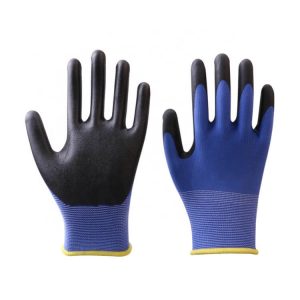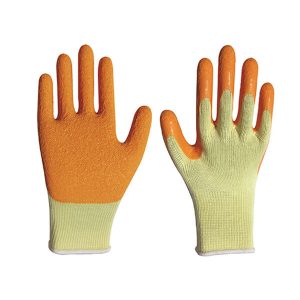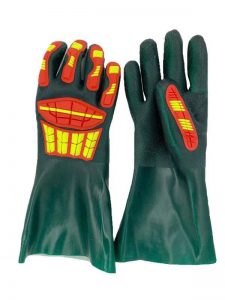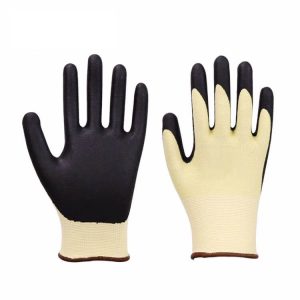What are chemical-resistant gloves and what are their characteristics?
Chemical-resistant gloves are a special type of hand protection equipment, mainly used to protect the hands from harmful substances when in contact with chemical substances. Depending on the nature of the chemical substances contacted, the material and performance requirements of chemical-resistant gloves vary.
Generally speaking, chemical-resistant gloves need to be made of materials that are resistant to chemical corrosion, penetration, abrasion, and tearing to cope with the erosion and penetration of different chemical substances. In addition, chemical-resistant gloves need to have good comfort and dexterity so that they can be easily used in various working environments.
Depending on the chemicals they come into contact with, chemical-resistant gloves can be categorized into various types, such as neoprene gloves, polyvinyl chloride gloves, butyl synthetic rubber gloves, and so on. These gloves can effectively resist the erosion and penetration of various acids, alkalis, salts and other chemicals to protect the hands.
In addition to material and performance requirements, chemical-resistant gloves also need to comply with relevant national and industry standards, such as EN388 and EN1071. These standards specify the size, structural design, material requirements and other aspects of the gloves to ensure the quality and safety of the gloves.
In conclusion, chemical-resistant gloves are an important personal protective equipment, which can effectively protect hand safety and reduce the occurrence of occupational diseases. When selecting and using chemical-resistant gloves, it is necessary to consider the nature and concentration of the chemical substances contacted, as well as the material and performance requirements of the gloves to ensure hand safety and health.
Introducing a few commonly used chemical-resistant gloves:
1) Nitrile Chemical-Resistant Gloves
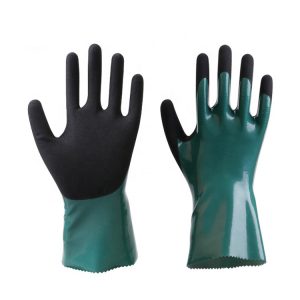
Pros:
- The ergonomics of these work gloves are excellent. They are comfortable to wear even in extended periods of time. You can move your fingers easily, so there is no feeling like your hands are constricted.
- These gloves are recommended for people who need a high level of resistant to chemicals. If you need maximum protection against harsh chemicals, these gloves are an excellent choice.
- We like how it remains breathable on the inside but has waterproof and oilproof properties that prevent these liquids from seeping in and soaking your hands.
- The grip of these gloves is commendable. You can pick up metals and other materials with a slippery surface with ease. Even when handling wet and oily materials, it still has a good grip.
Cons:
- These gloves tend to run small. Be sure to get a size bigger if you prefer a roomier fit.
- These are intended more for mild to moderate use. It can also be used for heavy-duty purposes but they might not last as long as expected.
2) Heavy Duty Cotton Jersey Shell or Half Coated Work Glove
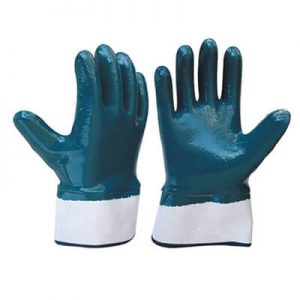
Pros:
- These gloves are tough and able to withstand heavier demands. They are ideal for heavy-duty usage as they don’t tear easily.
- Despite having a thicker and a more solid feel to them, these gloves still feel comfortable and flexible. You can work with these gloves on for hours and not feel hand fatigue easily. It helps that the inside has a soft textile liner to provide more comfort. They are also ideal to use during the cold season as they provide adequate thermal protection.
- If you frequently work with oil, petroleum, and grease, these gloves are a perfect fit. These gloves have moisture-repelling properties, so these thick liquids won’t be able to penetrate.
Cons:
- Some people might find these gloves stiff. They might require a bit more time to break-in.
3) Cotton Liner PVC Sandy Coated Work Gloves
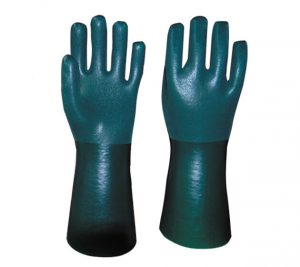
Pros:
- Right off the bat, you will notice how thick these work gloves are. They are made for heavier usage, ideal for industrial use. It’s thicker than the standard work gloves out there. It’s thick enough to protect your hands against abrasions.
- It stays in place. There are a lot of gloves that tend to slip off. These gloves won’t. They have a comfortable lining that prevents them from slipping off.
- You will like how long these gloves are. They can provide protection up to your wrists and arms, so if you are working with harmful chemicals, these should be perfect for your needs.
- The textured exterior makes it easier to grip objects, even the ones submerged in water or have a coating of oil。
- It’s great for chemical-resistant gloves.
Cons:
- Because these gloves are thicker, they have reduced tactility and dexterity. If you need your hands to feel more, these are not for you.
4) Cotton Liner PVC Sandy Coated Work Gloves
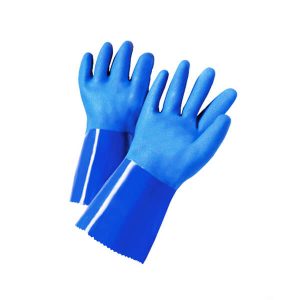
Pros:
- Chemical Resistance: PVC gloves excel in resisting a wide range of chemicals, effectively isolating acids, alkalis, oils and greases, and other harmful substances, providing users with reliable protection.
- Abrasion Resistance and Durability: Compared to other glove materials, PVC gloves have excellent abrasion resistance, resisting scratches and tears and retaining their functionality for a relatively long period of time.
- Affordable: PVC gloves are typically less expensive than some other glove materials, making them an affordable choice for cost-sensitive industries and situations where large quantities of gloves are required.These gloves provide all-around protection. It’s one of the most versatile chemical-resistant gloves out there because they can help protect your hands from acids, harsh detergents, adhesives, liquids and many other chemicals that might cause skin irritation.
- These chemical resistant gloves have superior friction properties and slip resistance.
Cons:
- Poor elasticity: PVC gloves have relatively poor elasticity and may be less suitable for work scenarios that require dexterity and adaptability.
- Non-breathable: Due to the poor breathability of PVC gloves, wearing them for a long period of time may lead to stuffy hands and discomfort.
- Easily smothered and sweaty hands: As PVC gloves are not breathable, they tend to smother the hands in sweat, leading to dampness and discomfort. If the inner layer of the glove adheres to sweat, it will also increase the friction and stickiness of the hand.
5) Green Nitrile Flocklined Nitrile Household Gloves
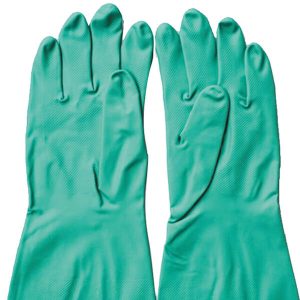
Pros:
- Excellent chemical resistance, can be exposed to a wide range of chemicals, to protect the hands from chemical damage.
- Relatively thick material with high abrasion and tear resistance, able to withstand heavier items and friction.
- Good elasticity, can adapt to different sizes of hand size, easy to put on and take off.
- Easy to clean and disinfect, not easy to breed bacteria and mold.
- So when you do light work such as household hygiene and cleaning, you can choose this chemical-resistant glove.
Cons:
- Not as flexible as latex gloves and may have some limitations on hand dexterity.
- Prolonged wear may lead to hand stuffiness and discomfort.
6) Safety Cuff Cotton Interlock Liner PVC Rough Sandy Coated Work Gloves
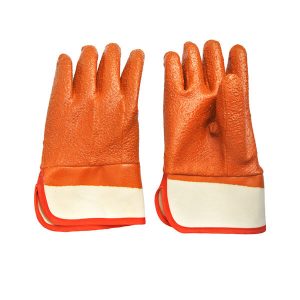
Pros:
- These are great for winter use. The gloves are warm and have good insulation. If you do outdoor work and you want your hands to stay nice and toasty, you will like these gloves as well.
- The inside liner of the gloves is soft and comfortable. You can wear them and take them off without snagging the material of the gloves.
- The outside material, on the other hand, is rough. It provides enough traction on its surface to avoid slipping. This is an ideal choice for anyone who needs a grippier pair of gloves to avoid losing grip on sensitive and slippery objects.
- Everything about these gloves is well-made. They have a solid feel to them. They don’t rip easily as well.
Cons:
- It does tend to be smelly on the inside. It’s probably from the inner lining absorbing the sweat. You might have to hang it up to dry to prevent the inside from getting stinky.
7) HPPE Palm Coated Waterproof and Oil-Resistant Cut Gloves
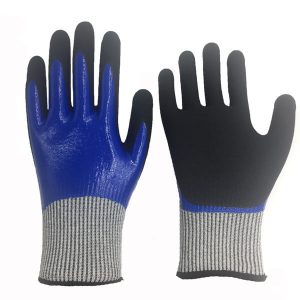
Pros:
- These gloves won’t just protect you from liquids and chemicals, they also offer excellent cut resistant properties. The finger area has a double coating, thereby providing the best protection. With their cut-resistant properties, you can use this to shuck oysters, fillet a fish, or do any kind of kitchen and gardening activity without subjecting your hands to injuries.
- Handling oily and wet materials isn’t a problem with this. The exterior of the material is very grippy.
- These have excellent durability. They were able to withstand a lot of damage and heavy usage. If you are a hard worker and you need a reliable pair of work gloves or chemical-resistant gloves, you might find these ones ideal.
Cons:
- The problem with these gloves is that they tend to be on the stiff side. We wish they offered more hand dexterity, so it’s not that difficult to move the fingers.
8) Long-Cotton Interlock Liner PVC Coated Long Work Gloves
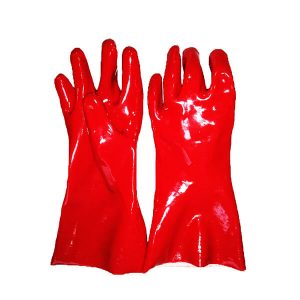
Pros:
- Chemical-Resistant gloves: The gloves excel in resisting a wide range of chemicals, effectively isolating acids, alkalis, oils and greases, and other harmful substances, providing users with reliable protection.
- Abrasion Resistance and Durability: Compared to other glove materials, The gloves have excellent abrasion resistance, resisting scratches and tears and retaining their functionality for a relatively long period of time.
- Affordable: PVC gloves are typically less expensive than some other glove materials, making them an affordable choice for cost-sensitive industries and situations where large quantities of gloves are required.These gloves provide all-around protection. It’s one of the most versatile chemical-resistant gloves out there because they can help protect your hands from acids, harsh detergents, adhesives, liquids and many other chemicals that might cause skin irritation.
Cons:
- Poor hand fit: As the size and shape of PVC gloves may not be well suited to the size and shape of some people’s hands, they can be inconvenient or uncomfortable to wear.
- Poor experience: Due to the material and production process of PVC gloves, they may not be comfortable enough to wear or may feel constricted.
- The anti-slip properties are relatively weak.

